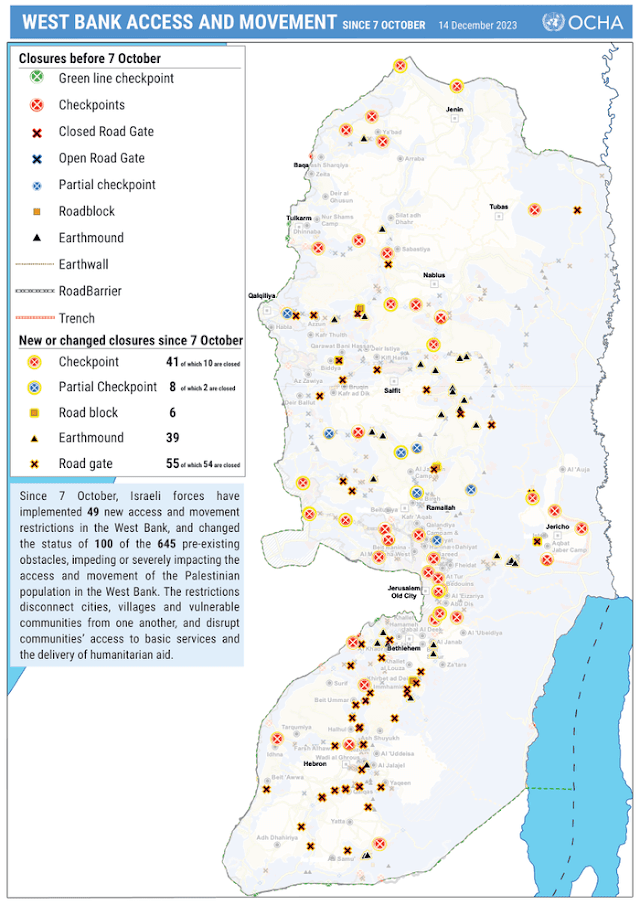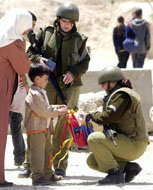[AS
ALWAYS
PLEASE GO TO THE LINK
TO READ GOOD ARTICLES IN
FULL: HELP SHAPE
ALGORITHMS (and
conversations) THAT EMPOWER
DECENCY, DIGNITY, JUSTICE &
PEACE... and hopefully Palestine]
Yesterday, I attended a checkpoint tour through the West Bank, organized
by an Israeli nonprofit organization. Traveling through the seam zone
between the West Bank and the Green Line, we sat on an air-conditioned
tour bus and pointed at various hills containing settlements, valleys
with a few patches of Palestinian farmland, and about five checkpoints,
three of which we stopped to take photos and listen to a few examples of
injustice. Filled mostly with Israelis between the ages of 50 and 80,
the tourists were eager to listen and learn. Yet there were things that
kept ringing as the tour went on, red flags marking subtle rhetoric and a
lack of understanding within the supposedly understanding group. I
found the questions and points I wanted to be addressed were not only
avoided, but perhaps even consciously ignored. Where I wanted there to
be progress, there wasn’t any.
Before I proceed, I would to like to preserve the anonymity of the group
as well as the individuals I am talking about, so I will not mention
any proper names. Furthermore, this organization should be commended for
its work within checkpoints themselves - aiming to ensure the safety
and dignity for Palestinians - its public call within Israeli society to
end the occupation, and its attempts to educate Israeli society on
several injustices coming with the occupation. My account does not
encompass all of Israeli activism and does not try to; rather, it is
simply a personal interpretation of one example of Israeli activism.
~
Our tour guide repeated several times as she began her talk: THIS IS NOT
A POLITICAL TOUR. WE WILL NOT TALK POLITICS HERE. As many times she
repeated these words in different English sentences, there were still
trace amounts of fear, as if she was afraid the bus would rise up in
arms if she even breathed the word “Palestine” or “occupation”.
And thus the tour began. Our first destination was a small agricultural
Palestinian village inside of the seam zone. We filed off of the bus and
observed an agricultural checkpoint, witnessing a Palestinian boy
stopped in front of the gate because he didn’t have a permit for his bag
of fertilizer. The tour guides agreed publicly it was awful, but did
not fail to keep throwing in security logic along the way: “If he wanted
to blow himself up, why would he do it in his own village?”, answering
the questions of the more security-minded folk in the audience. While
that is a valid response in terms of security, they were failing to
address the larger picture.
The next stop was a meeting with an “Arab friend”, a Palestinian man who
told his story between constant reassurances of his friendship with the
Israeli people, an effort seemingly tending to the invisible yet
ever-present (and in my opinion, many times irrational) fear of
international hatred towards Jews. He served us water, coffee and tea,
and faced many questions from the audience not about the checkpoint
dehumanization he faced, but about the lack of authority the PA held, as
if Israel was no longer responsible for the frustrations he faced.
After this we stopped for lunch at a falafel shop in a small town still
inside the seam zone. People lined up to use the one-stall bathroom and
gave extra money to the cashier, a deed seemingly valiant but, in all
honesty, quite patronizing.
Following lunch were several bathroom stops, a stop in Jayyous where we
did not even step a foot off of the air conditioned bus, listening
instead to a villager repeatedly reassure us he had “many Israeli
friends”; only after this was repeated several times did he quickly tell
his story and then sold everyone olive oil. We then stopped again, this
time to buy real life “Arab sweets”, and then continued our in-bus trek
winding through steep hills, pointing out settlements on top and
Palestinian villages below, and finally coming back to the seam zone
where we stopped at two checkpoints, one deserted and one still fully
functioning.
Stopping briefly in the parking lot, we listened to the tour guide
stress, “Yes, and once President Obama told Israel to get rid of this
checkpoint, it did! See? Oh and it used to be awful, one of the worst.
And now it is gone. Well, not really gone, because it is still blocking
the road. But there are no soldiers here anymore.” Did Israel add any
others to replace this one? I wanted to ask.
Before any of us really had time to process what we were seeing, we were
back at the bus station in Israel, filing civilly off of our tour bus.
And I couldn’t help but feel . . . strange. While I was hoping to learn
more about the construction, use and abuse of checkpoints, I instead
received subtle rhetoric on the legitimacy of Israel (which I am not
denouncing, however that decision should be my own, and not be
constantly forced onto me), an inaccurate and frankly completely
separated view of “the Arabs” (the use of that word alone exemplifies a
lack of understanding) and a look into factions of supposedly leftist
Israeli society. We were all spoon-fed a few examples of injustice mixed
with a subtle separation from “the Arabs”, not drawing on similarities
between the two peoples but instead separating them even more. It was as
if the message was, “well, they do suffer, but they all also want to
kill us minus a few of them. So we still need a lot of separation and
security from them.”
Yet with this separation, peace will never be possible. If the Israeli
society is unwilling to understand and relate to those they call “the
Arabs”, (and conversely if the Palestinians are unwilling to understand
the Israeli point of view) a lasting peace will never be a reality.
Bailey Fisher is a Writer for the Media and Information
Department at the Palestinian Initiative for the Promotion of Global
Dialogue and Democracy (MIFTAH). She can be contacted at mid@miftah.org.















.jpg)







